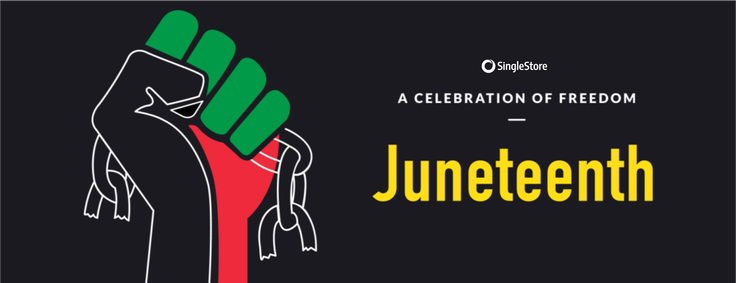
Last week, on Friday, June 19th, the U.S. celebrated Juneteenth. This holiday, recognized by most US states, commemorates the day back in 1865 when enreplicad African Americans in Galveston, Texas, got the word that the Civil War had been over for almost two and a half years – and that they were just then receiving notice of their freedom. SingleStore marked the occasion by observing a minute of silence, scheduling a day of programming related to systemic racism and the Black experience in America, and establishing Juneteeth as an annual company holiday.
In the true spirit of SingleStore’s core values, employees were given the opportunity to learn and grow outside of their comfort zone with a focus on “learning, extending perspectives, and expanding virtues” as a community. Employees were invited to join in a Juneteenth presentation by Milan Balington, executive director of the African American Community Service Agency, who spoke about the need for Black Americans to be treated better.
The Juneteenth program that SingleStore organized also included the presentation and follow-up discussion of the documentary “13th”; a discussion of the film “Get Out”; a pre-reading and discussion of Michelle Alexander’s book “The New Jim Crow”; and viewing and discussion of the podcast “1619.” SingleStore also held a planning session for a SingleStore-sponsored virtual STEM/STEAM Day event for underserved children, which is a collaborative event with co-sponsors Cisco and the National Coalition of 100 Black Women-Silicon Valley Chapter. The event is tentatively planned for March 2021.
While the Juneteenth holiday provides all of us with a great opportunity to consider and learn about the Black struggle in the U.S., our efforts to get educated about and act to improve this situation should not – and cannot – end there. As employers, SingleStore and other companies across the country and around the world must work to better understand the barriers people of color face in attaining and retaining job opportunities. Society and businesses benefit when we do a better job at addressing diversity and inclusion, and eliminate bias.
SingleStore Vice President-Legal, Aileen Casanave, is the executive sponsor for SingleStore’s Diversity & Inclusion efforts. She served as the moderator of Friday’s post-presentation Q&A with Balington, explaining why these efforts are so important, and how the COVID-19 pandemic has only increased the challenges that people of color face in the job market.
Casanave notes that research shows that traditional recruiting steps tend to be part of a weeding-out process, rather than a true hiring process, for people of color. “Studies show that resumes with names like Jamal or LaToya, while containing the same skills and education as resumes with names like Michael and Lisa, are more likely to be rejected,” says Casanave, president of the National Coalition of 100 Black Women-Silicon Valley Chapter.
On average, she says, people of color are less likely to obtain interviews, so they gain less experience in interviewing. As a result, they may then come across as less experienced or comfortable, when they do get an interview, compared to other candidates. She adds that shelter-in-place orders instituted in light of the coronavirus have amplified the challenges that people of color face during the recruiting and hiring process.
She explains that, because interviews are often now conducted remotely rather than in person, people of color must contend with challenges – such as the need for appropriate face-front lighting issues, so that melanin-rich skin is clearly illuminated for less-than-optimal laptop camera, tablet, or mobile phone interactions. And, because they may have less experience in interviews, they may be even more awkward when talking via microphone and looking at the interviewer via a laptop or cell phone screen.
“The extra challenge in the new-normal workplace is making a solid first impression,” Casanave notes. “Given the added challenges that people of color must overcome, the existing, widespread feeling of having to work twice as hard to make the same impact as other candidates are exacerbated.”
Lauren Clark, who handles recruiting for SingleStore, adds, “As a startup, we are all working together as owners with a vested interest in building this company, and this effort doesn’t exist in a vacuum. Teams must work together across the organization and with our customers to enable and ensure our individual and collective ability to succeed. This is only possible when we hire individuals with the ability to work on diverse teams, and with a diverse range of people.”
The SingleStore hiring process, she explains, includes asking the following questions:
- What skill sets are not represented within this team?
- How can we get people who are not just a culture fit, but are culture adds?
- How can we bring new perspectives, greater diversity, and fresh approaches to the table?
“The best way to do this is by having a diversity of thought, education, experience, outside interests, and expertise,” she says. “We work hard to clearly define roles and interview processes, as well as to train employees to be aware of their unconscious bias and level the playing field. A consistent process ensures we’re comparing candidates on an apples-to-apples basis, helping us to do evaluations fairly, and to avoid unconscious bias. We recognize that conscious efforts toward diversity in the workplace drive innovation, increase creativity, make recruitment more successful, decrease turnover, and capture more of the market.”
As Raj Verma shared in his recent blog post about Juneteenth, the SingleStore team is learning and growing all the time. These efforts accelerate that process.





